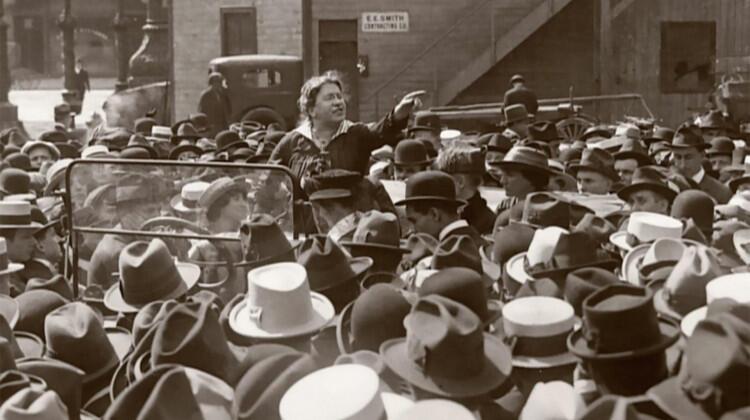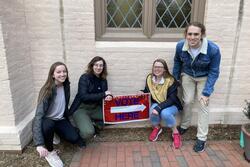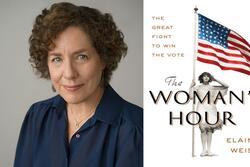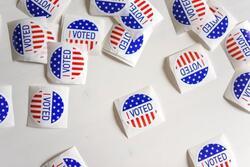Voting Isn't Enough: A Look Back at Emma Goldman's Radical Anti-suffrage
This essay is part of JWA’s 2020 Suffrage Series on the blog.
There are familiar rhythms to election cycles—first anxiety, then hope, and finally, cynicism. Like clockwork, each primary season, someone on my Facebook feed shares a variation of this quote: “If voting did anything, they’d make it illegal.” Sometimes it’s attributed to Mark Twain, but usually Emma Goldman is cited as the source. (For the record, there’s no evidence either one of them ever committed that quote to print.)
I’ve been thinking a lot about Goldman during the past few weeks, as the Democratic front-runner has emerged, and we approach the 100th anniversary of the ratification of the Nineteenth Amendment. A few weeks ago, Wisconsin officials made the dangerous decision to hold their primary during a pandemic, meaning many Wisconsinites had to decide between their health and casting a ballot. I was fiercely angry at Wisconsin’s Supreme Court for moving forward with the election, but also shocked and dismayed at how many people cheered those who did stand in line to vote as heroes upholding democracy. In contrast to the majority of anti-suffragists who approached the issue of women voting from the conservative right, Goldman formulated a case against suffrage from the left on the basis of anarchist and feminist principles. She might argue that what happened in Wisconsin illuminates the dangers of viewing voting as the ultimate civic virtue or as an obligation: It becomes not a strategy for attaining political ends, but rather, a political end in itself.
It has been heartening to see conversations about suffrage history in the United States shift within the last few years. We now more widely acknowledge that the Nineteenth Amendment, in practice, granted primarily white and middle-to-upper class women the right to vote. Many of America’s most famous suffragists were actively hostile to the idea of Black suffrage. The Southern Poverty Law Center’s database of suffrage history gets right to the point: “White women eventually realized that relying on racial exclusion would be the only way to get Southern states to ratify the Nineteenth Amendment.”
This reality of white, well-to-do women compromising on issues of equality in order to gain representation themselves is crucial historical context when considering Emma Goldman’s essay “Woman Suffrage.” Summarized in the modern era, it is often erroneously cited as proof that Goldman was anti-feminist. But Goldman’s ideas were based on a true, liberating anarchism that guaranteed freedom from oppression by dismantling structures of power designed to keep people poor, disenfranchised, sexually repressed, and docile. Because of this, she saw the United States’ systemic flaws as reflections of concentrated power. Voting, then, could be understood as a way to offer the illusion of choice to the masses. To Goldman, the women who wanted to be included in this political process were missing the forest for the trees.
“Woman clamors for that ‘golden opportunity’ that has wrought so much misery in the world, and robbed man of his integrity and self-reliance,” Goldman writes. “The poor, stupid, free American citizen! Free to starve, free to tramp the highways of this great country, he enjoys universal suffrage, and, by that right, he has forged chains about his limbs. The reward that he receives is stringent labor laws prohibiting the right of boycott, of picketing, in fact, of everything, except the right to be robbed of the fruits of his labor. Yet all these disastrous results of the twentieth-century fetich [sic] have taught woman nothing. But, then, woman will purify politics, we are assured.”
Goldman’s aversion to women’s suffrage was primarily grounded in the idea that voting only serves to prop up an inherently unjust system, one that cannot be redeemed at the ballot box. Her rejection of the idea that women’s inclusion in the US political process would somehow “purify” it is also important. Goldman accurately ascertained that women’s votes, like men’s, could be bought; their morals corrupt or absent. What good are women’s votes if they are in the service of evil? “I am not opposed to woman suffrage on the conventional ground that she is not equal to it,” Goldman argued. “I see neither physical, psychological, nor mental reasons why woman should not have the equal right to vote with man. But that can not possibly blind me to the absurd notion that woman will accomplish that wherein man has failed."
In 2020, staring down the possibility of Donald Trump’s second term, it may seem foolish to take anything an anarchist had to say about voting to heart. But I’d argue Goldman’s ideas about harmful structures of power are a useful framework for cultivating and directing righteous anger at the injustices baked into our government, and remind those of us who were originally denied the right to vote that we should not allow ourselves to be political pawns.
I am not interested in putting forth an argument for why one must vote at all costs, nor do I believe voting is as actively hostile as Goldman warned it could be. However, there is value in questioning the oft-espoused idea that voting is the most important form of civic engagement. Much ink has been spilled by op-ed writers desperate to drive young people to the polls. Many Americans insist it is laziness that prevents people from voting every few years and argue that the young in particular have no “right” to complain if they do not cast a ballot. Of course they have a right to complain.
For many Americans facing systemic and generational disadvantages, little changes between Democrat and Republican administrations. This is to say nothing of the barriers that prevent wide swaths of people (young, poor, undocumented, etc.) from engaging in the electoral process even if they want to vote: fewer polling centers nationwide, increasingly stringent voter ID laws, reduced capacity for early and remote voting. There are many passionate voting advocates who work tirelessly to eliminate these barriers and sympathize with those who feel disengaged and alienated from the political process as it exists today. But many do not, and instead take personal offense to non-voters.
On a personal level, I see voting as a form of harm reduction. I am, by many metrics, an extremely privileged person, and I try to cast my ballots on behalf of those who cannot. But outside of the major state and national elections that happen every few years, I focus my energy in two ways: advocating for specific policies (like universal healthcare) that are not tied to one particular candidate’s campaign and getting involved with the needs of my local community. In the age of COVID-19, mutual-aid networks have gone mainstream. We are turning to our neighbors—both those who literally live around us and our social networks—more than ever before. Contrary to mainstream ideas about anarchism, mutual aid and building strong communities are tenets of the ideology.
To echo Goldman, electoral politics won’t save us because they were not designed to do so. A middle ground—somewhere between feeling engaged just by casting a ballot and simply disengaging entirely—might look like strengthening mutual aid networks, organizing locally, and showing up for causes outside of election years. It may be time to get comfortable with being uncomfortable; let’s unlearn the more simplistic ideas about civic virtue we were taught in grade school.
Our systems are broken—this is more clear than ever. We all want something better, but have different ideas about the best ways to make positive changes. In 2020, as we look back on the hundredth year since the passage of the Nineteenth Amendment, it seems wise to challenge much of what we have taken for granted to be true. Voting within an inherently unjust system will never tear the system down; we must decide what is worth saving and what requires expanding our political imagination to achieve. To employ a quote also attributed to a whole host of different people: The truth will set you free—but first, it will piss you off.








The only way out is separation - as a country we can achieve only so much when two nearly equal sized populations cancel each other out. Appoint a commission, divide the place up. Let each side have the freedom it can’t have under our system.